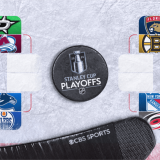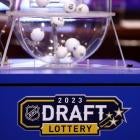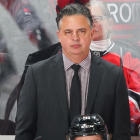
More NHL Playoffs: Schedule, TV listings | Expert Picks | Bracket | Scores | Odds
It takes a special team to have missed just one round of the playoffs over the last three years and that’s what the Los Angeles Kings organization has. When you consider the constrictions of recent shrinking salary cap numbers, the increased parity across the league and the fact that playing that much hockey over a three-year span could really wear on a team, it’s actually downright silly what this group has done.
But this is also a special team in how it was built, how it got here and where it’s going next. General manager Dean Lombardi likely should be considered one of the finest general managers in the game after what he’s done over the last several seasons at the helm of this organization.
The Kings are not typical in their construction. Like many good teams, they built through the draft to find their cornerstone pieces on which to build a champion, but it’s in the rest of the work Lombardi and his staff have done to make sure those cornerstones don’t go waste that is astounding.
Being smart in trades and perhaps even smarter in the free agent market has helped these Kings become a continual championship-caliber club.
"We don't want to sacrifice our identity, sell our soul, to get a quick fix," Lombardi told reporters on a recent teleconference. (via LA Times) And they haven't.
Of the 21 players that have played more regularly this postseason for Los Angeles, 11 were drafted by the organization, seven were acquired via trade and only three were signed as unrestricted free agents.
Of those three UFAs, only one was signed to a standard player contract-- defenseman Willie Mitchell -- in 2010. The other two were signed to entry-level deals -- Jake Muzzin, who went unsigned after being drafted by the Pittsburgh Penguins (whoops), and backup goalie Martin Jones, who was signed as an undrafted free agent out of juniors -- meaning both were quite cheap.
That’s pretty remarkable work from Lombardi. How many teams have made costly mistakes in the unrestricted free agency market, binding them to long-term deals at too costly an annual cap hit that severely impedes their ability to construct a championship-caliber team? I may or may not have been looking directly northeast in the Toronto Maple Leafs’ general direction as I typed that.
Lombardi has had to pay a large price in some of his trades, most notably the separate deals that brought Jeff Carter and Mike Richards to Los Angeles, but it's only costly if it doesn't work.
There are 18 players left over from that Stanley Cup team in 2012. To keep that kind of group together in a salary cap era shows that this is a team that not only had eyes on a championship, but a vision for sustainable success beyond one title.
The team had a good start, building off of first-round draft picks Dustin Brown (13th overall in 2003), Anze Kopitar (11th overall in 2005) -- both selected before Lombardi took over the club in 2006 -- and Drew Doughty (second overall in 2008). Jonathan Quick was selected 72nd overall in the third round in 2005 (also pre-Lombardi).
The team also has former first-rounders Trevor Lewis and Tanner Pearson on the roster and had a lot of success in the mid-rounds as well. Tyler Toffoli, Slava Voynov and Kyle Clifford were second-round picks. Game 7 overtime hero Alec Martinez and Dwight King were fourth-round choices.
But then you look at the trades Lombardi pulled, taking advantage of teams’ outcasts, essentially exploiting market inefficiencies to collect Richards, Carter and most recently Marian Gaborik. Don't want your very talented, underperforming forward anymore? Dean Lombardi will take him.
In his first year on the job, Lombardi made some great trades that brought in franchise staples Justin Williams, Matt Greene and Jarret Stoll.
Over the course of the 2011-12 season, he brought in Richards and Carter, perhaps the missing veteran pieces that helped bring home that Stanley Cup.
History may show that Lombardi overpaid for Richards, whom he acquired prior to the 2011-12 season from the Philadelphia Flyers after it was reported that the Philly captain had fallen out of favor, but it sure doesn’t look bad if the Kings are lifting the Cup again.
Carter was also shipped out of Philadelphia, but first to the Columbus Blue Jackets. Lombardi brought Carter to LA to rejoin Richards, his former teammate and dear friend, at a cost of Jack Johnson and a first-round pick. Carter is under contract until 2021 and is still one of the league’s more consistent goal scorers. He’s also been a top performer for the Kings this postseason.
Lombardi's most recent masterstroke came when he once again took advantage of a player losing his way with his current team. This time it was Marian Gaborik at the most recent trade deadline. With several big chips out there with scoring talent, the Kings had to do something. There were Thomas Vanek and Matt Moulson among the natural scorers available. And then there was Gaborik, oft-injured, struggling through his season a year removed from being traded by the New York Rangers. He seemed perhaps the least attractive option of the three, but that also made him fairly affordable.
The Kings gave up Matt Frattin, a second-round pick and fifth-round pick to acquire the pending unrestricted free agent from the Blue Jackets. He has responded with an NHL-leading 12 goals this postseason, including a host of timely scores like the game-tying goal in Game 7 of the Western Conference Final. Even if they don't re-sign Gaborik, that was absolutely a deal worth making.
To be as good as the Kings, it does take a little luck, like a franchise goaltender slipping to 72nd overall, or your No. 2 defenseman (Muzzin) not getting signed by the team that drafted him, or certain guys running afoul of their previous franchise. It takes skill to make those lucky bounces count.
It also takes development. Eleven of the current LA Kings regulars first played for the Manchester Monarchs, the Kings’ American Hockey League affiliate. Their minor league system continues to feed into their NHL roster, providing cheaper, but NHL-ready talent. That’s a huge advantage to any organization that can boast such a steady stream of players between the two entities.
Any team also needs good coaching to take the roster that has been built and fit it within the right system, making sure the lines are structured properly to get the best results. Darryl Sutter has had this team firing on all cylinders for the better part of three seasons, proving to be a masterful decision maker on the fly and keeping the team at an even-keel in the direst of circumstances.
Perhaps the scariest fact about this team is only four players among the 20-plus regulars that have played in the Stanley Cup Playoffs have contracts expiring after this season and there’s probably enough wiggle room under the cap if the Kings want to try to bring Gaborik back if they so choose.
They have all the pieces for another deep postseason run already in place for next year. That’s incredible.
We’ve heard a lot about teams wanting to follow the "Bruins Model" and the "Blackhawks Model," but the truth is there is no super-secret special formula to building a championship team. That said, whatever Lombardi is doing sure seems to be working as consistently as anyone else, but it will be pretty darn difficult to ever hope to copy.





















